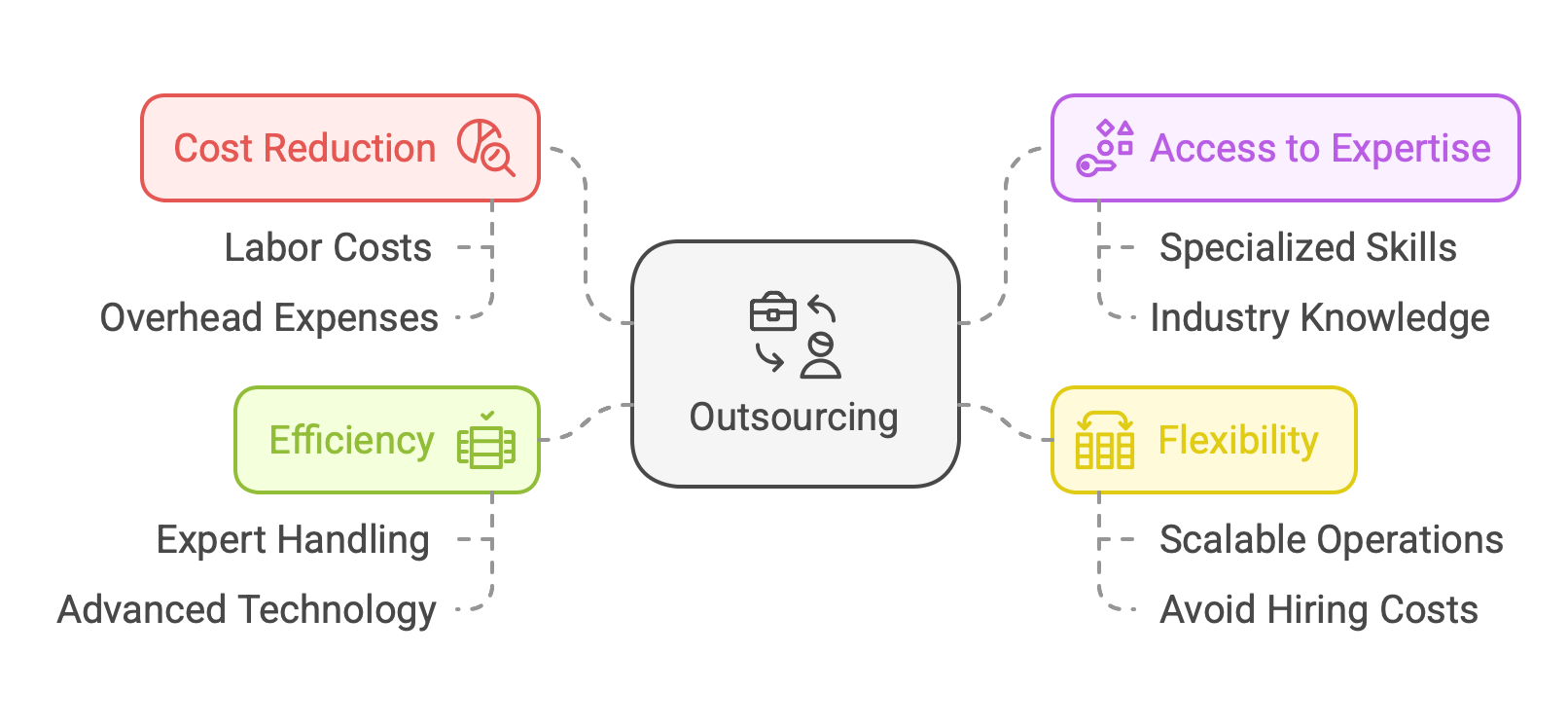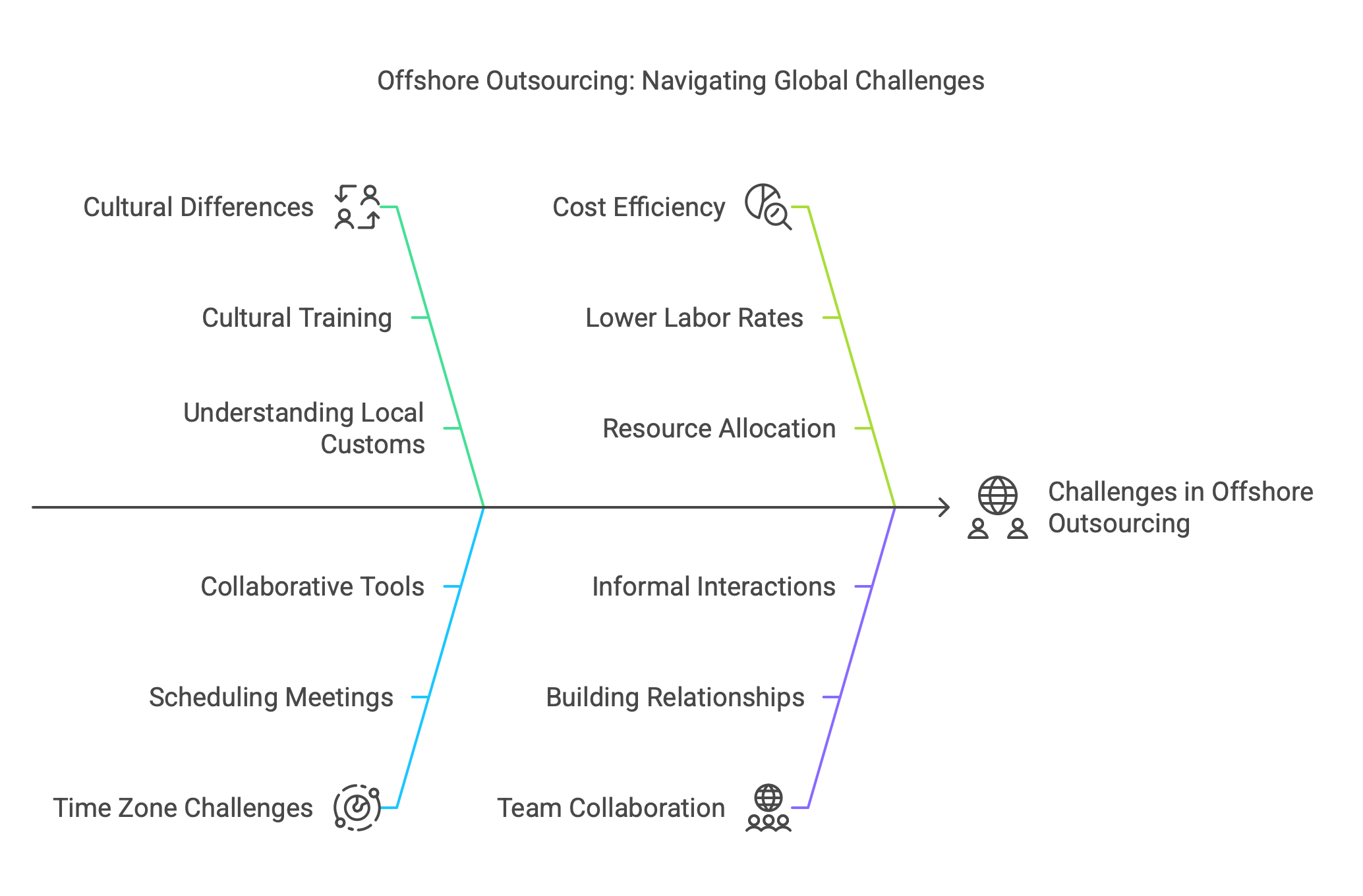This blog will explore the key- differences between offshoring and outsourcing. It will also highlight their benefits. We will explore how each strategy affects operations, costs, and productivity. This will help you find the best approach for your business goals. Lets dive in!
WHAT IS THE KEY DIFFERENCE BETWEEN OUTSOURCING AND OFFSHORING?
Outsourcing and offshoring are often used interchangeably, but they serve different purposes. Outsourcing is the practice of delegating specific tasks to outside providers. This can occur within a company's home country or across borders.
The primaryaim is usually cost efficiency and access to specialized skills. Offshoring means moving work to another country. Companies do this for lower labor costs and, sometimes, to expand their markets.
While outsourcing focuses on task delegation, offshoring emphasizes geographical relocation. These nuances help businesses make better decisions on their strategies and resources.
HOW DOES OUTSOURCING DIFFER FROM OFFSHORING IN TERMS OF BUSINESS OPERATIONS?
Outsourcing and offshoring represent twodistinctstrategies in business operations. Outsourcing means hiring third-party vendors to do specific tasks or services.
They are often in the same country. This approach lets businesses focus on their strengths and use outside experts. Offshoring means relocating entire processes to different country for cheaper costs. Firms might choose this for labor savings or for skills not found locally.
Outsourcing can improve flexibility and scalability by using local resources. Offshoring can create complications. Offshoring involves managing overseas teams and different regulations. Each strategy has uniqueeffects. Companies must consider them, based on their goals and resources.
WHAT ARE THE KEY CHARACTERISTICS THAT DISTINGUISH OUTSOURCING FROM OFFSHORING?
Outsourcing or offshoring, while often used interchangeably, have distinct characteristics. Outsourcing is delegating specific business functions to third-party vendors, regardless of their location. This could mean hiring a local firm or engaging with an overseas provider.
The primarygoal is efficiency through specialization. Offshoring refers to relocating business operations to another country. Companies pursue this strategy for various reasons. They want to cut costs and access a global talent pool. A key characteristic that sets them apart is control over processes.
Outsourced-tasks can be managed from anywhere. But, they are still under the company's oversight. In contrast, offshored operations may must companies to give up some control. This is due to distance and differing regulations. These nuances can help businesses make informed decisions in today's competitive market.
HOW DO COMPANIES DECIDE BETWEEN OFFSHORING AND OUTSOURCING?
Companies often weigh several factors when deciding between offshoring and outsourcing. The nature of the task plays a pivotal role in this decision. For complex projects that need specialized skills, outsourcing may be best. Cost considerations are also crucial.
- Cost Comparison: Businesses compare the lower labor costs associated with offshoring against the costs of using local firms.
- Operational Control: Companies prioritize the level of control they maintain over their operations.
- Outsourcing (often local): Favored by companies desiring direct oversight and control.
- Offshoring: May appeal to companies comfortable with relinquishing some operational control in exchange for potential cost savings.
WHAT ARE THE MAIN BENEFITS OF OUTSOURCING?
Outsourcing offers a range of advantages that can significantly enhance a company's operations. One of the most notable benefits is cost reduction. By outsourcing non-core functions, businesses can reduce labor costs and operational expenses. Outsourcing provides access to specialized expertise and skills that may not be available in-house. Increased flexibility is also crucial in todays fast-paced market. Companies can quickly scale operations based on demand and avoid the burden of hiring and training new staff. Outsourcing often leads to better efficiency as experts focused on those tasks streamline processes.
HOW DOES OUTSOURCING CONTRIBUTE TO COST SAVINGS?
Outsourcingis astrategy. It can save businesses a lot of money. By outsourcing some tasks, companies can reduce costs. Labor costs are one of the primary areas where outsourcing shines. Many firms take advantage of lower wages in different regions. This lets them access skilled labor without overspending.
Outsourcing reduces overhead expenses related to infrastructure and technology. When you partner with an established service provider, you won't need to buy new equipment or update your software. Another benefit is increased flexibility.
Outsourcing involves delegating specific tasks or processes to external service providers. For web development, Laravel outsourcing is a popular choice. This allows businesses to adjust operations based on demand, avoiding the high costs of hiring full-time employees. These savings free up resources that organizations can reinvest in core activities and innovation, keeping them competitive in today's fast market.WHAT TYPES OF BUSINESS FUNCTIONS ARE COMMONLY OUTSOURCED?
Many businesses opt to outsource various functions to enhance efficiency and reduce costs. Customer service is a popular choice. It lets companies provide 24/7 support through specialized teams. Another common area for outsourcing is human resources. This includes recruitment processes, payroll management, and employee training. By delegating these tasks, organizations can focus more on strategic goals.
IT services are also frequently-outsourced. From software dev to cybersecurity, businesses must keep up with tech. External experts can help. They do this without needing a big in-house team.
Specialized agencies have expertise that may not exist internally. They also provide fresh views on brand engagement. Accounting and finance roles are regularly delegated. Outsourcing bookkeeping or tax prep keeps accurate records. It also frees up time for core business tasks.
HOW CAN OUTSOURCING IMPROVE EFFICIENCY AND FOCUS ON CORE COMPETENCIES?
Outsourcing allows companies to delegate non-core tasks, freeing up valuable resources. This shift lets teams focus on their strengths: to innovate and improve quality. When businesses hand off functions like customer service or payroll, they streamline operations.
Employees can focus on strategic projects that support the company's long-term vision. Enhanced efficiency emerges as experts handle specialized tasks. Outsourcing partners often bring advanced tech and industry knowledge. They can deliver faster and perform better.
As a result, core competencies are sharpened. Companies become more agile. They adapt quickly to market changes while focusing on business growth. By outsourcing routine tasks, firms can succeed in a tough market.
WHAT ARE THE ADVANTAGES AND DISADVANTAGES OF OFFSHORING?
Offshoring presents several advantages. Companies can access a global talent pool, often finding skilled labor at lower costs. This cost efficiency can significantly boost profit margins and enhance competitive positioning. Time-zone differences can also be an asset. By leveraging round-the-clock operations, businesses may achieve faster project turnaround times. Offshoring also isn't without its challenges. Communication barriers often come from language differences or cultural misunderstandings. They can result in errors and frustration. Managing quality control becomes more complex when teams are dispersed across the globe. Ensuring consistent standards requires diligent oversight. Additionally, companies might face backlash from local employees concerned about job security. This aspect needs careful consideration in any strategic planning process surrounding offshoring initiatives.
HOW DOES OFFSHORING IMPACT LABOR COSTS AND PRODUCTIVITY?
Offshoring lowers labor costs. It lets companies tap into lower-wage markets. This can lead to large savings for businesses, particularly those in high-cost regions. A U.S. tech company might find that hiring developers in India or Eastern Europe can cut costs. It could do so without losing quality.
These cost reductions enable firms to divide resources more effectively. Productivity is another crucial aspect influenced by offshoring. Lower labor costs are attractive. But, they must be balanced with efficiency and output. Offshored teams may have unique skills. They may face challenges, like languagebarriers and culturaldifferences.
Effective management becomes essential when navigating these complexities. Companies that train and integrate their offshore teams often see better results. This is in contrast to those that do not rank communication and collaboration.
WHAT CHALLENGES DO COMPANIES FACE WHEN OFFSHORING THEIR OPERATIONS?
Offshoring presents various challenges that can complicate operations. One significant hurdle is the cultural difference. Misunderstandings in communication styles and work ethics can lead to friction between teams. Language barriers also play a crucial role. Even if employees speak the same language, nuances may be lost. This can hurt clarity and efficiency.
- Time Zone Challenges: Coordinating meetings and project timelines becomes complex due to significant time differences across geographically dispersed teams.
- Quality Control Oversight: Maintaining consistent quality control can be challenging when managing remote teams. Ensuring adherence to company standards often requires more oversight than anticipated.
- Geopolitical and Regulatory Risks: Offshoring introduces potential risks stemming from political or regulatory changes in the offshore location. This instability can disrupt operations and introduce unforeseen challenges.
Companies must navigate these external factors while striving for operational consistency and excellence.
HOW DOES OFFSHORING AFFECT TIME ZONE DIFFERENCES AND COMMUNICATION?
Time-zone differences can be a double-edged sword in offshoring. On one hand, they allow for round-the-clock productivity. While your team sleeps, offshore partners could be working on critical tasks. This would ensure faster turnaround times. These differences pose challenges for real-time communication.
Coordinating meetings becomes tricky when teams are scattered across continents. Misunderstandings may arise due to delays in responses or differing work hours. To combat this issue, companies often establish overlapping hours. Finding specific times when both teams are free can boost collaboration.
Utilizing technology is another key element. Tools like video conferencing and instant messaging help maintain clarity despite geographical barriers. To build relationships with offshore teams, you must manage expectations. Effective communication is essential for this.
WHEN SHOULD A COMPANY CONSIDER OUTSOURCING VS OFFSHORING?
The decision to offshoring or outsourcing hinges on specific business needs. Companies should test their core competencies first. If a function is non-essential but labor-intensive, outsourcing can free up valuable resources. If cost efficiency is a priority, offshoring might be preferable. It allows access to skilled labor at lower costs in different regions. Timing plays a crucial role too. Growth-phase businesses often consider outsourcing. It can help them stay flexible while scaling quickly. Industry type matters too. Tech firms may favor offshoring for software dev. There are specialized skills abroad. But, local outsourcing may benefit customer service. It better aligns with cultural expectations. Clear goals and needs will guide companies to choose the right strategy.
WHAT FACTORS SHOULD BUSINESSES EVALUATE WHEN CHOOSING BETWEEN OUTSOURCING AND OFFSHORING?
When deciding between outsourcing and offshoring, businesses must first assess their specific needs. Understanding the scope of work is crucial. Cost implications play a significant role as well. Companies should analyze potential savings versus the investment required for each option. Next, consider the desired level of control over operations.
Some firms prefer maintaining oversight while others are comfortable delegating tasks completely. Cultural compatibility is another essential factor. Misalignments can lead to communication issues that may affect productivity. Think about scalability requirements. Businesses often need solutions. They must adapt quickly to changing demands. Quality and efficiency must not suffer.
HOW DO BUSINESS NEEDS INFLUENCE THE DECISION TO OUTSOURCE OR OFFSHORE?
Business requirement play a crucial role in the decision to outsource-offshore. Companies often review their core activities. They seek areas where outside experts can add value. Outsourcing lets firms use specialized skills without the cost of full-time hires. It's key when efficiency is a priority.
For example, firms often outsource-customer service and IT support to be more agile. If cost reduction is a priority, offshoring can cut labor costs. It can do this while keeping control over processes. This strategy is good for tasks in manufacturing and software.
| Aspect | Offshoring | Outsourcing |
|---|---|---|
| Definition | Shifting operations to another country. | Delegating tasks to a third-party vendor. |
| Cost Savings | Focus on labor cost reduction in specific regions. | Reduction in operational and infrastructure costs. |
| Control | Greater control over operations (in-house team). | Limited control (managed by external provider). |
| Expertise | Relies on building in-house expertise. | Leverages specialized expertise of the vendor. |
| Flexibility | Requires long-term commitment (own setup required). | Higher flexibility; easy to switch vendors. |
| Communication | Direct communication with own team. | Relies on vendor's communication and management. |
| Time Zone Challenges | Possible delays due to time-zone differences. | Vendors may offer 24/7 support to address this. |
| Ideal for | Core processes and building long-term global presence. | Non-core tasks and quick project turnarounds. |
It saves money based on location. Companies must weigh immediate demands against long-term goals. To find the best fit for their strategy, assess scalability and flexibility.
WHAT INDUSTRIES OR TASKS ARE BETTER SUITED FOR OFFSHORING VS OUTSOURCING?
Certain business industries thrive on offshoring due to their specific needs. Manufacturing, for instance, often benefits from cheaper labor in low-cost regions. It can also scale quickly there. This allows companies to boost production without large investment. On the other hand, outsourcing is ideal for tasks like customer service or IT support.
Specialized firms can handle these functions. They focus on efficiency and expertise. Creative sectors such as graphic design or marketing may also lean towards outsourcing. By collaborating with external experts, businesses get fresh ideas. They can also flexibly divide resources. Choosing between these approaches depends on cost considerations, project requirements, and desired outcomes.
HOW DOES OFFSHORE OUTSOURCING COMBINE ELEMENTS OF BOTH STRATEGIES?
Offshore-outsourcing blends the business practices of both outsourcing and offshoring seamlessly. Companies leverage external expertise while relocating certain operations to different geographical regions. This hybrid approach allows firms to access specialized skills not found locally. By using global talent, businesses can cut costs of in house staff. They enjoy lower labor rates without sacrificing quality or innovation. This strategy fosters flexibility. Organizations can quickly scale their teams to meet project demands. They must maintain focus on core functions. Collaboration often boosts efficiency. It unites teams across borders for a common goal.

WHAT ARE THE UNIQUE BENEFITS OF OFFSHORE OUTSOURCING?
Offshore-outsourcing offers a mix of benefits of offshoring. They can greatly improve a company's performance. Using global talent pools, businesses access skills not available locally. Cost efficiency is another strong benefit.
Companies often find that hiring skilled pros abroad is cheaper than an in house team. This allows for better allocation of resources towards core business activities. Cultural diversity also brings fresh perspectives and innovative ideas into the mix. Working with global teams fosters creativity and problem-solving. It improves the business strategy.
HOW DOES OFFSHORE OUTSOURCING ADDRESS CULTURAL DIFFERENCES AND TIME ZONE CHALLENGES?
Offshore-outsourcing brings teams from different cultures together. This collaboration fosters a blend of ideas and diverse perspectives.
Companies outsource often invest in cultural training to bridge gaps. Understanding local customs can enhance communication. Effective scheduling becomes crucial here. Regular meetings must accommodate all parties involved. Using collaborative tools helps maintain transparency and project alignment.
Building relationships is key in overcoming these barriers. Creating informal channels for interaction helps team members bond. It softens cultural boundaries and boosts teamwork.
WHAT ARE THE IMPLICATIONS OF OUTSOURCING AND OFFSHORING FOR SOFTWARE DEVELOPMENT?
Outsourcing and offshoring have profound implications for software dev. By using a global talent pool, companies can find rare skills that may not be available locally. This often leads to enhanced innovation and unique solutions. Outsourcing lets businesses quickly scale their teams. It saves the cost of hiring full-time employees. It creates flexibility in resource allocation based on project demands. These strategies also introduce challenges like miscommunication due to language barriers. Time zone differences can hinder collaboration. But, if managed well, they can boost productivity. Quality control is another concern; differing standards across regions may impact final deliverables. Companies must use strong processes. They must meet their expectations. They should also build relationships with external partners.
HOW DOES SOFTWARE OUTSOURCING DIFFER FROM GENERAL BUSINESS PROCESS OUTSOURCING?
Outsourcing SAAS development focuses specifically on the development and maintenance of software applications. This includes tasks such as coding, testing, and debugging. Many companies often seek specialized skills for complex projects that must in-depth technical knowledge.
In contrast, general business process outsourcing (BPO) encompasses a broader range of outsourcing services. These can include customer support, human resources, accounting, and more administrative tasks. BPO primarily aims to enhance operational efficiency rather than specific product output.
The skill sets involved also differ significantly. Software-outsourcing typically requires developers familiar with programming languages and frameworks. Meanwhile, BPO professionals might focus on interpersonal skills or process management expertise.
WHAT ARE THE ADVANTAGES OF OFFSHORING SOFTWARE DEVELOPMENT PROJECTS?
Offshoring software dev has many benefits. It can greatly enhance a company's capabilities.
- Access to Global Talent: Offshoring allows businesses to tap into a wider pool of skilled professionals, regardless of location. This expands their hiring options beyond local limitations.
- Cost Efficiency: Lower labor costs in offshore locations can significantly reduce expenses, allowing for better resource allocation while maintaining quality.
- 24/7 Productivity: Leveraging different time-zones enables continuous workflow. Teams in different locations can work simultaneously, leading to faster project completion and quicker releases.
- Scalability and Flexibility: Offshoring provides flexibility in scaling operations up or down based on project needs, allowing for efficient resource management.
They can do this without the overhead of hiring full-time staff. This adaptability supports agile development practices and helps meet evolving market needs efficiently.
HOW CAN COMPANIES MANAGE QUALITY CONTROL IN OFFSHORE SOFTWARE DEVELOPMENT?
Managing quality control in offshore software dev requires a strategic approach. Companies need to establish clear standards and expectations from the outset. This involves creating detailed documentation. It must outline the project's specs, coding standards, and testing procedures. Regular communication is key.
Frequent check-ins can help align teams on goals and timelines. Utilizing collaboration tools can ease seamless interactions between onshore and offshore teams. Implementing robust testing protocols is essential for maintaining quality. Automated testing finds issues early in development. It reduces the chance of serious problems later.
Training also plays a vital role in ensuring high-quality outcomes. Ongoing education about company practices or tech helps all team members, no matter where they are. It builds a shared understanding. Tracking performance with metrics will help companies find areas to improve. Analyzing these insights allows businesses to refine their processes over time effectively. By focusing on these aspects, companies can ensure quality in offshore software dev.

